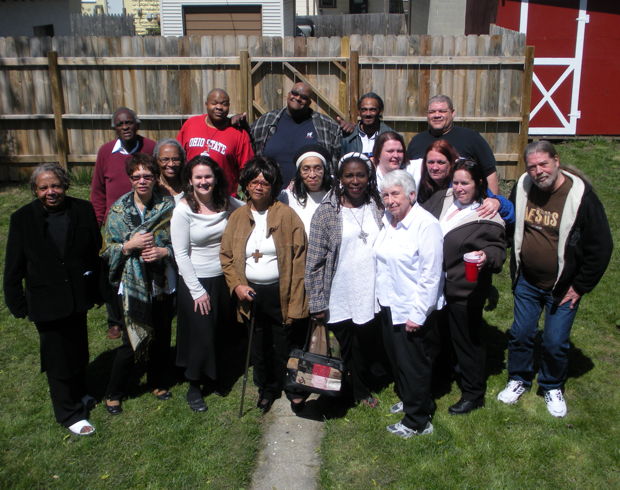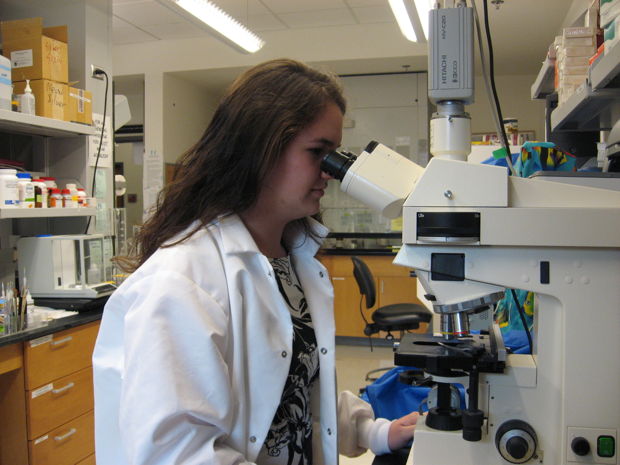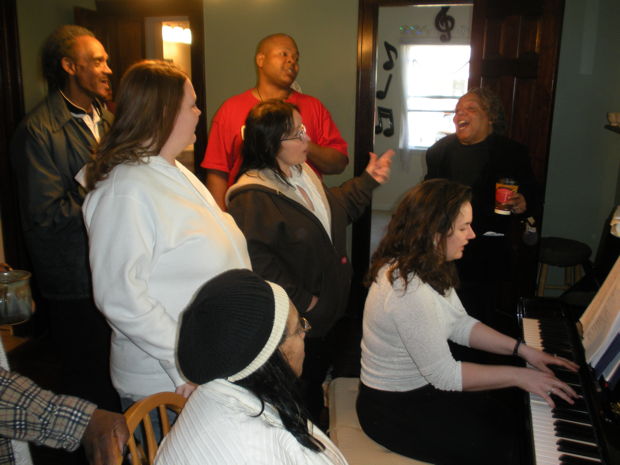Many of our academic colleagues and mentors wince when they learn where my husband and I live. They assume it was our only choice on grad students’ stipends.
We came to Columbus to pursue doctoral degrees, but moved into one of the city’s blighted neighborhoods to build relationships with sisters and brothers in Christ. We believe that to draw nearer to God’s grace requires falling in love with His children. And it’s hard to fall in love from arm’s length. In the process, we’ve learned just how abundant this life can really be.

We joined a neighborhood church that ministers to underprivileged folks in our area, building a community that desires radical fellowship across established lines of division. Together, we share meals, birthdays, burdens, and joys. The richness of the Kingdom is lived out in the beautiful mix of people learning to embrace one another.
My Sunday mornings are shared with many races, languages, and cultures; the very wealthy and the destitute, high school dropouts and tenured professors, mental illness and academic genius. We have found that as we draw near in friendship to those we might otherwise ignore, we enter into a more intimate relationship with the Body of Christ. We begin to understand His Kingdom more clearly, both as it is, and how it could be.
And yet such diversity (particularly across race, class, and gender) is often hard to come by in the very institutions best suited for worshipful discovery of God’s creation. Churches and universities both struggle to reflect the fully diverse image of Christ.
As a result, Monday mornings feel like culture shock as I return each week to my graduate work. I struggle to discern how these two worlds fit together, and how to bring the blessings of rich reconciliation into my academic environment.
Many within higher education observe that racial and socioeconomic diversity is disproportionately low in our departments. Yet, as we continue to lose promising scholars unable to continue their education, we sometimes feel helpless to combat it, or are too unfamiliar with the injustices that contribute to it. Too often, outreach to marginalized populations becomes tokenized, treated as the “pet projects” of a few invested faculty members. Sometimes, we tackle economic disparity, but forget that racial injustice persists, and is often associated with additional economic disadvantage. At other times, committees may point to high international enrollment, believing that the need for diverse recruiting has been satisfied, while domestic students of color continue to be severely underrepresented in graduate programs.
Many of the systemic barriers of inequality that have stymied research programs for decades still remain today. Absorbed in our own academic pursuits, it is easy to forget that this level of education and privilege is not the norm. It is important to remind ourselves of our privileged status and the advantages we received to get us to this position.
As academicians, we have worked vigorously to get where we are, but most of us have also had some help along the way. Both my parents went to college, and knew what it took to succeed there. They were also both fully employed, so I was able to focus on my classes during high school, rather than having to help put food on the table. I attended a strong school with small class sizes, modern textbooks/equipment, and individualized college prep. My family had ready transportation to get me to extracurricular activities, and the money to invest in study guides, music lessons, and SAT prep.

These and other advantages made me competitive in the college application process, and I received significant scholarship awards. What the scholarships didn’t fund, my parents could cover because they had the financial security to have built up significant college savings.
I excelled in college, gaining early undergraduate research experience. I worked hard for high grades, but I did so without ever having to get a job to cover tuition, or to send money to support my family at home. When my dad lost his job in the 2008 downturn, my enrollment was unaffected. When I got sick, I had insurance. My room and board were always covered.
After four years, I graduated debt-free from a prestigious undergraduate institution, and was again able to leverage my academic performance to be awarded a modest stipend at a good graduate program. Having retained good credit, I was able buy a house and begin to build investments for the future. I had a car to get to class and a quiet place to study, free from distraction. I am well poised to obtain the skills and resources I will need as I continue in my career.
From early in academic life, success begets itself. I’ve worked hard, but I also know that I have had help. Do some get a PhD without these advantages? Absolutely. But it is a lot harder to do (and it’s already hard enough). Academia isn’t for everyone, and there is meaningful contribution to be made for the Kingdom in any profession. But too many are limited beyond what they might otherwise choose.
There are thousands of brilliant scholars in this world that never even have the chance to graduate high school because they lack the same set of privileges that I often take for granted. When we allow such inequality to persist, we perpetuate generational injustice and deprive ourselves of fullness of the body of Christ.
If we become too entrenched in our own work and fail to pay forward our own blessings, we all miss out on the opportunities God has for us within higher education. What insights into God’s creation are we missing because the best-suited scholar isn’t here to share it with us? We need engaged minds tackling humanity’s questions from a wide range of perspectives. When we are surrounded by homogeneity we stifle ourselves, both academically and spiritually.

Therefore, we must use the blessing we have received as a part of our chosen vocation to become active allies for environments that flourish with the diversity that God has given us. We can actively mentor students and junior faculty members that might not have a large community of support at your institution. Or we can get involved in recruitment in order to offer a warm face to those trying to decide if graduate school is the right move. We can engage with undergraduates that are struggling to see how they fit in the academic world, or become actively involved in the communities outside the university that are raising the next generation of scholars.
What else can you do? For one, support the initiatives that are already in place to educate and advocate for diversity at your university. Give of your time on committees that influence hiring, admissions, and administrative policies. Be mindful of the importance of diverse role models when you invite guest speakers to your department. Remember to include broad perspectives when you fill your own research and personnel positions. Day to day, be a voice of advocacy that affirms that these issues affect the entire community, both within and outside of the academic arena.
Perhaps most importantly, continue your own education about racial and economic injustice, as well as the institutionalized system of privilege from which so many of us benefit. I invite you to discover By Their Strange Fruit, a blog I started my first year in graduate school to explore how Christianity’s often-bungled relationship with race and racism affects modern ministry and justice. In particular, I’d recommend the following blog articles to interested readers: Academic Admissions, White History Month, and Campus Ministries.
At the moment, my husband and I find ourselves in a very fortunate position. We have few responsibilities, no dependents, and the freedom to live where we choose. We are in a unique time of our lives: we enjoy many privileges, but also are not yet so financially advantaged as to become isolated from the rest of the world.
As we grow in our careers, hopefully one day gaining faculty positions, children, and other responsibilities, we may not be so willing to live as we do now. The temptation to sequester ourselves will become stronger. We will be more inclined to engage in charity rather than to invest in relationships and mutual edification. My prayer is that we will remain intentional and intimately engaged with the pursuit of God’s Kingdom both within and apart from the university.